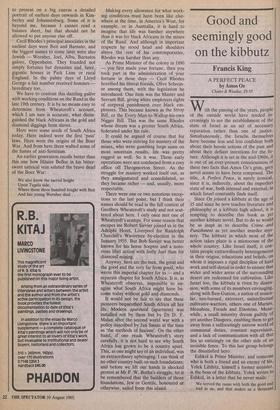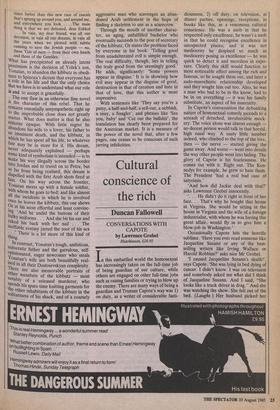Good and seemingly good on the kibbutz
Francis King
A PERFECT PEACE by Amos Oz Chatto & Windus, £9.95 ■■111 With the passing of the years, people of the outside world have tended in- creasingly to see the establishment of the state of Israel as an act of necessary reparation rather than one of justice. Simultaneously, the Israelis themselves have become less and less confident both about their heroic actions of the past and about their defiant intentions for the fu- ture. Although it is set in the mid-1960s, it is out of an ever-present consciousness of these two facts that Amos Oz's grim, grey novel seems to have been composed. The title, A Perfect Peace, is surely ironical, since it is, indirectly, about the imperfect state of war, both internal and external, in which Israel constantly finds itself. Since Oz joined a kibbutz at the age of 15 and since he now teaches literature and philosophy at a kibbutz high school, it is tempting to describe this book as yet another kibbutz novel. But to do so would be as inapt as to describe Crime and Punishment as yet another murder mys- tery. The kibbutz in which most of the action takes place is a microcosm of the whole country. Like Israel itself, it con- tains people extraordinarily heterogeneous in their origins, educations and beliefs, on whom it imposes a rigid discipline of hard work and self-denial in order to ensure that wider and wider areas of the surrounding desert are redeemed for cultivation. Like Israel too, the kibbutz is riven by dissen- sion, with some of its members envisaging, along with Ben-Gurion, a nation of muscu- lar, sun-burned, extrovert, unintellectual cultivator-warriors, others one of Manes, Menuhins, Freuds and Einsteins. Mean- while, a small minority dream guiltily of yet another Diaspora, enabling them to get away from a suffocatingly narrow world of communal duties, constant supervision, and a lack of communication with all that lies so enticingly on the other side of an invisible fence. To this last group belongs the dissatisfied hero.
Eshkol is Prime Minister, and someone who is both a friend and an enemy of his, Yolek Lifshitz, himself a former minister, is the boss of the kibbutz. Yolek writes to Eshkol, in a letter that he never mails:
We served the cause with both the good and bad in us, and that makes us a thousand times better than this new race of rascals that's sprung up around you, and around me, and everywhere you look . . . The main thing is that we are defeated, dear Eshkol • . . In vain, my dear friend, was all our devotion, in vain all our dreams, in vain all the years when we plotted with subtle cunning to save the Jewish people — nu, these Yids of ours — from their own hands and those of the Gentiles.
What has precipitated an already latent pessimism is the decision of Yolek's son, Yonatan, to abandon the kibbutz in obedi- ence to Spinoza's dictum that everyone has a role in his life and that the only choice that we have is to understand what our role is and to accept it gracefully. The one flaw in an otherwise fine novel is the character of this rebel. That he remains essentially unsympathetic right up to the improbable close does not greatly matter. What does matter is that he also remains opaque. With little regret he abandons his wife to a lover, his father to an imminent death, and the kibbutz, in which he has spent all his life, to whatever fate may be in store for it. His dream, never adequately explained — perhaps some kind of symbolism is intended — is to make his way illegally across the border into Jordan and to travel on to Petra; but so far from being realised, this dream is dispelled with the first Arab shots fired at him. On his way across the frontier, Yonatan meets up with a female soldier, With whom he goes to bed; and like almost all the incidents in which he is involved once he leaves the kibbutz, this one shows Oz at his most effortful and least convinc- ing. 'And he undid the buttons of their bulky uniforms . . . And she bit his ear and raked his back with her nail . . . The ineffable ecstasy jarred the root of his sex ' • There is a lot more of this kind of thing.
In contrast, Yonatan's tough, ambitious, autocratic father and the garrulous, self- opinionated, eager newcomer who steals Yonatan's wife are both beautifully real- ised in all their Dostoievskyan complexity. There are also memorable portraits of other members of the kibbutz — most notably of a released murderer, who spends his spare time knitting garments for the other inhabitants of the kibbutz in the solitariness of his shack, and of a coarsely aggressive man who scavenges an aban- doned Arab settlement in the hope of finding a skeleton to use as a scarecrow.
Through the mouth of another charac- ter, an aging, unfulfilled bachelor who eventually succeeds to the post of secretary of the kibbutz, Oz states the problem faced by everyone in his book: 'Telling good from unadulterated evil is simple enough. The real difficulty, though, lies in telling the truly good from the seemingly good.' He adds, significantly: 'Some powers appear in disguise.' It is in showinig how evil may appear in the disguise of good, destruction in that of creation and hate in that of love, that this author is most impressive. With sentences like 'They say you're a patsy, a half-and-half, a sell-out, a nebbish, a sissy, a finagler', and phrases like 'See you, baby' and 'Cut out the bullshit', the translation has clearly been prepared for the American market. It is a measure of the power of the novel that, after a few pages, one ceases to be conscious of such jarring infelicities.











































 Previous page
Previous page